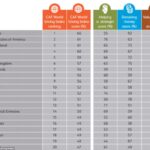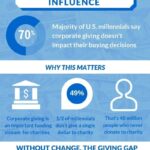by Leo Ramirez, Jr., CEO, Founder of Encast
A lot of people who want to help often struggle with where to make donations of their limited resources. Recent natural disasters with hurricanes and earthquakes have brought many more people into the community of charitable givers. But there are important issues to consider before giving your gift.
I’ve spent over a decade immersed in this space and can offer a few insights after starting a non-profit business incubator, a non-profit micro-giving platform, and workplace engagement, Giving as a Service™ Encast.
The Admin Fee Paradox
First, measuring a non-profit’s “quality” on percentage of funds used on admintrative fees is, to be blunt, unfair. Non-profits are a business, and like any business, must spend money to make money. Unless they have a significant endowment or make substantial use of volunteers, you must dig under the covers to judge for yourself if admin fees are reasonable or not.
Charity Navigator does a nice job rating organizations, especially since tweaking their rating system after widespread criticism of heavily weighting it toward low admin fee organizations. Even so, they’ve rated less than 9,000, or 0.5% of the 1.8 million 501(c)(3)s in the U.S. Since 90% of all U.S. charitable giving (about $390 billion in 2016) goes to 10% of all non-profits, Charity Navigator has, reasonably, focused its efforts on the largest organizations to make the greatest impact with their ratings.
Remember that organizations can get very creative in their accounting to show low admin fees and this is especially true for larger ones who can afford top financial talent.
Volunteer, Then Give
We hired a Development Consultant with my first non-profit and they said something that really stuck: “Ask for money, get advice. Ask for advice, you might eventually get money.” While volunteering isn’t the same as giving advice, it is a nice way to see how an organization works.
As a volunteer, your sweat equity can contribute to the organization’s mission. This, of course, can culminate in serving on a Board of Directors, which is where fiscal responsibility, strategic planning, management, and succession planning directly impact the viability of an organization.
In the end, when you see your impact as a volunteer, you’ll give more. Two thirds of volunteers donate to organizations for which they volunteer, and half give more because they volunteer!
The Social Effect
If you’re curious about where to give, ask someone you know. Giving can be — and usually is — a social act. We’re most heavily influenced about where to give by who we know. This means we are likely to select organizations that were recommended by close friends and associates. If any of you saw an organization that sounded interesting from someone whose reputation and opinion you respect, you’ll probably take a closer look, too.
The Bottom Line
When you give, look for impact. How is a cause executing on mission? Who can vouch for them? What’s being said about them? And, most importantly, what are their measurable outcomes?
If you’re new to philanthropy, build your cause portfolio through others then mold it by your own experiences. In time, you’ll be someone others lean on to build theirs.
For international and U.S.-based organizations, experienced philanthropists and corporations are always seeking high impact causes. You might consider ones that have the backing of respected philanthropists like Bill Gates, Oprah, and Lady Gaga or brands featured in Fortune’s most charitable companies list.
For regional and local causes, ask those you know and trust. Talk to people who have volunteered for, given to, or benefitted from organizations you’re considering.
While there are many objective ways to measure impact, your choices will, inevitably, be highly subjective. That’s okay.
It’s more important to give then never to have given at all.
































































































































